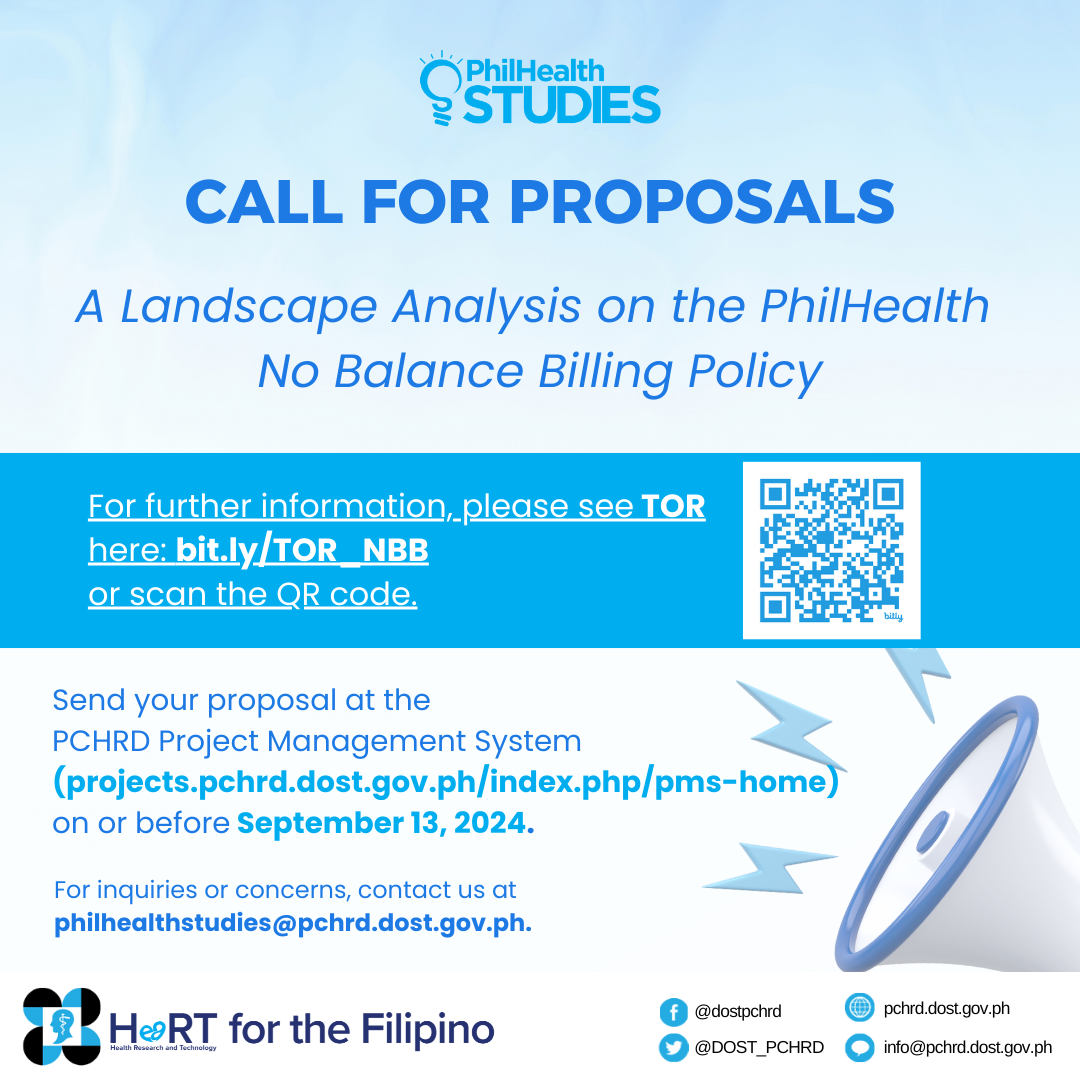CALLS AND EVENTS
Call for Proposals: A Landscape Analysis on the PhilHealth No Balance Billing Policy

The Call for Proposal for the “A Landscape Analysis on the PhilHealth No Balance Billing Policy” project is NOW OPEN.

Interested proponents may now submit their proposal through the PCHRD Project Management System (https://projects.pchrd.dost.gov.ph/index.php/pms-home) on or before September 13, 2024.
Background & Rationale
In 2011, the No Balance Billing (NBB) policy was initially introduced along with the implementation of the twenty-three (23) procedural and medical case rates. In 2013, Section 34-A of RA 10606 re: National Health Insurance Act of 2013 and Section 43 of its IRR stipulated that, “no other fee or expense shall be charged to the indigent patient, subject to the guidelines issued by the Corporation”. Since then, the NBB policy was strengthened several times (PhilHealth Circular No. 3, s. 2014, PhilHealth Circular Nos. 2017-0006 and 2017-0017).
The NBB policy is a PhilHealth initiative geared at ensuring financial risk protection. It specifically mandates all government hospitals to manage their indigent patients without collecting any other fees beyond the package rate. It emphasizes the need for these hospitals to utilize its revenues from PhilHealth to equip themselves with adequate and appropriate infrastructure, supplies and services in order that its NBB patients will not incur overhead expenses.
Over the past several years, the PCARES was tasked to collect information on the NBB using a prescribed feedback form. Yearly trend analysis of the data showed inspiring results. NBB grew from 48 percent in the first quarter of CY 2015 to 82 percent in the first quarter of CY 2020. And among these, the purchase of drugs and medicines outside the health facility remained the top reason for out-of-pocket expenses. The NBB monitoring was interrupted during the COVID-19 pandemic but resumed in the third quarter of CY 2023.
Despite the reduction of balance billing obtained in the patient surveys, the Philippine National Health Accounts (PNHA) report showed that total out-of-pocket (OOP) expenses continued to grow by 8.8 percent and 10.5 percent in 2017 and 2018, respectively, which accounted for more than 50 percent of the total health expenditures.
Under the UHC Act of 2019, the NBB was expanded to include even private patients admitted under basic accommodations. Now called the “no co-payment” principle, it redirected the focus from simply government hospitals and indigent patients to all hospitals with patients availing of basic amenities. This was expounded by the DOH through its Administrative Order No. 2022-001.
As PhilHealth shifts towards and aligns its mandate with the UHC Act, the enforcement of no co-payment for basic accommodations raises potential challenges among the various stakeholders and even the policy makers. The unclear or lack of policy guidance was raised in a recent budget hearing by the House of Representatives and resulted in a directive for PhilHealth to review its NBB policy.
Thus, this study intends to examine the PhilHealth NBB policy, its character and context, the implementation status, the gaps and opportunities that beset the application or administration of the NBB, and serve as template for PhilHealth in preparing its guidelines on the no co-payment.
———————————————
For more information, please see the enclosed Terms of Reference at https://bit.ly/TOR_NBB.
Should you have further inquiries or concerns, you may contact us through philhealthstudies@pchrd.dost.gov.ph.




